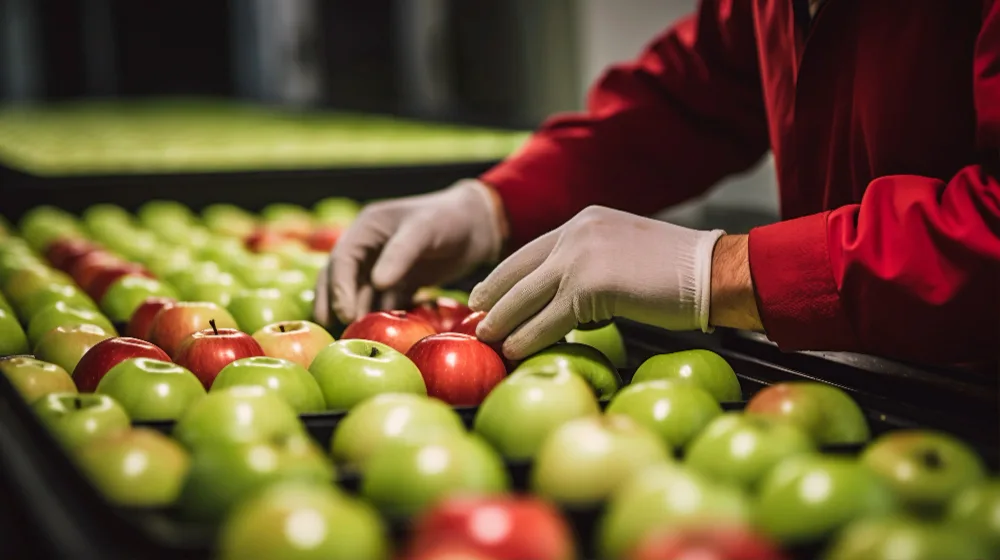Are you curious about what foods are banned by FSSAI, the regulatory authority governing food safety in India? Dive into this eye-opening blog post as we uncover 10 surprising items that have been prohibited for consumption.
From artificial fruit ripening agents to Chinese milk products, get ready to explore the world of forbidden foods and why they have been deemed unsafe for consumption.
Let’s open the mystery behind these banned substances and understand why FSSAI takes strict measures to ensure our well-being through food safety regulations.
What is FSSAI in food?
Food Safety and Standards Authority of India (FSSAI) plays a crucial role in ensuring the safety and quality of food consumed by millions of people across the country.
It is a government agency responsible for regulating and supervising the food industry to promote public health. Its main objective is to ensure that the food available in the market is safe, hygienic, and free from contaminants.
Know more about FSSAI on Twitter
FSSAI issues licenses to food businesses after inspecting their premises and verifying compliance with regulations. These licenses indicate that a company follows the necessary guidelines for producing safe food products.
By enforcing strict regulations and monitoring compliance, FSSAI aims to prevent adulteration, substandard products, and misleading labeling in the food industry. This helps safeguard consumer health while promoting trust in the quality of products available in the market.
Let’s dive into some of the food items that have faced the ban hammer due to safety concerns.
1. Artificial Fruit Ripening Agents
Have you ever wondered how some fruits look perfectly ripe, even when they are out of season? Artificial fruit ripening agents might be the secret behind this illusion. These chemicals are used to speed up the ripening process and enhance the appearance of fruits for consumers.

The Food Safety and Standards Authority of India (FSSAI) has banned the use of these agents due to concerns about potential harm to human health.
However, despite their effectiveness in making fruits appear more appealing, artificial ripening agents can pose serious health risks. Consumers should be cautious when purchasing fruits that may have been artificially ripened. Opting for naturally ripened fruits not only ensures better taste but also safeguards your well-being.
By being aware of what goes into the food we consume, we can make informed choices that promote our health and overall well-being.
2. Chinese Milk and Milk Products
Chinese Milk and Milk Products have faced scrutiny due to various food safety concerns. The Food Safety and Standards Authority of India (FSSAI) has banned the import and sale of these products in India.
One major issue with Chinese milk is the presence of melamine, a toxic chemical that can lead to serious health complications when consumed. This harmful substance was found in Chinese baby formula in the past, causing widespread health issues among infants.
Additionally, inadequate hygiene standards in Chinese dairy farms have raised alarms about the quality of their milk products. Contaminants such as bacteria and other pathogens pose significant risks to consumers’ health.
Given these alarming factors, it’s crucial for consumers to be vigilant about the source of their milk and milk products to ensure they are safe for consumption.
3. Chinese Garlic
Chinese garlic has been a topic of concern due to its excessive use of harmful chemicals in cultivation. The Food Safety and Standards Authority of India (FSSAI) has banned Chinese garlic imports to protect consumers from potential health risks.
The use of pesticides and other chemicals in Chinese garlic farming practices poses serious threats to human health. These chemicals can have adverse effects on the body, leading to various health issues when consumed regularly.
By banning Chinese garlic, FSSAI aims to ensure that only safe and high-quality food products are available in the Indian market. Consumers can now be more confident in purchasing locally sourced garlic without worrying about harmful contaminants.
It is essential for individuals to be aware of the origin of their food products and make informed choices to safeguard their well-being. By avoiding Chinese garlic, consumers can contribute towards promoting healthier eating habits within the community.
4. Energy Drinks
Energy drinks, known for their caffeine and sugar content, have been banned by FSSAI due to their potential health risks. These beverages may provide a temporary energy boost, but the high levels of stimulants can lead to adverse effects on the body. Excessive consumption of energy drinks has been linked to increased heart rate, high blood pressure, and even cardiac issues.

The combination of caffeine and other ingredients in energy drinks can also disrupt sleep patterns and lead to dependency.
Furthermore, these drinks often contain artificial additives and sweeteners that can be harmful in the long run. It’s essential to be mindful of what we put into our bodies and opt for healthier alternatives like water or natural fruit juices.
In light of the ban imposed by FSSAI, it is crucial to prioritize our well-being over temporary energy fixes. By making informed choices about our dietary habits, we can promote overall health and vitality without relying on potentially harmful substances.
5. Sassafras Oil
Sassafras oil, derived from the root bark of the sassafras tree, is known for its distinct aroma and flavor. However, it has been banned by FSSAI due to its potential health risks.
The main concern with sassafras oil is its high safrole content, which has been linked to liver damage and cancer in studies. Despite its historical use in traditional medicine, modern research has raised red flags about its safety.
While some may miss the unique taste that sassafras oil adds to certain dishes and beverages, it’s important to prioritize our health above all else. By avoiding products containing sassafras oil, we can reduce our exposure to harmful compounds and safeguard our well-being.
When exploring alternative ingredients for your recipes, consider experimenting with safer options that offer similar flavors without compromising on taste or quality. Your body will thank you for making informed choices when it comes to your food selections.
6. Genetically Modified Foods (GMOs)
Genetically Modified Foods (GMOs) have been a topic of controversy in the food industry. These are foods that have had their genetic material altered in a way that does not occur naturally through crossbreeding or natural recombination. The FSSAI has banned certain GMOs due to concerns about their potential impact on human health and the environment.
While proponents argue that GMOs can help increase crop yields and reduce reliance on pesticides, critics raise issues regarding long-term health effects and biodiversity loss.
The ban by FSSAI serves as a precautionary measure to protect consumers from any potential risks associated with consuming genetically modified foods.
By prohibiting the sale of GMO products, FSSAI aims to uphold food safety standards and ensure public well-being. As more research is conducted on the impacts of GMOs, it remains crucial for regulatory bodies like FSSAI to stay vigilant in safeguarding the interests of consumers.
7. Potassium Bromate
Potassium Bromate, a food additive used to strengthen dough and improve bread texture, has been banned by FSSAI due to its potential health risks. Studies have shown that potassium bromate may be carcinogenic when consumed in high amounts.
The use of this chemical in food products is concerning as it can potentially pose a risk to human health. While some countries still allow the use of potassium bromate, FSSAI has taken a precautionary approach by banning it entirely.
Consumers should be aware of the ingredients listed on food labels and avoid products that contain potassium bromate. Choosing whole foods or organic alternatives can help reduce the intake of harmful additives like potassium bromate.
The decision to ban potassium bromate reflects FSSAI’s commitment to safeguarding public health and ensuring the safety of food products available in the market.
8. Foie Gras
When it comes to controversial foods, Foie Gras often sparks heated debates. This delicacy is made from the liver of ducks or geese that have been force-fed to fatten their livers. The process, known as gavage, involves inserting a tube into the bird’s throat and overfeeding them with grain.
Foie Gras has faced criticism due to animal welfare concerns surrounding the force-feeding practices involved in its production. Many countries and organizations have banned or restricted the sale of Foie Gras on ethical grounds.
The FSSAI also prohibits the sale of Foie Gras in India due to these reasons. While some may argue that Foie Gras is a culinary delicacy enjoyed for centuries, others advocate for more humane treatment of animals in food production.
Whether you view Foie Gras as a gourmet delight or an unethical product, its ban by FSSAI highlights ongoing discussions about animal welfare and ethical consumption in the food industry.
9. Brominated Vegetable Oil (BVO)
Brominated Vegetable Oil (BVO) is an additive that was once commonly found in citrus-flavored sodas and sports drinks. It’s used to keep the flavoring oils suspended in the liquid, preventing them from separating. However, BVO has been banned by FSSAI due to health concerns.
Studies have shown that BVO can accumulate in fatty tissues and cause potential negative effects on the body. High consumption of BVO has been linked to issues like memory loss, skin rashes, and even neurological symptoms.
Many countries have recognized these risks and have taken steps to restrict or ban the use of BVO in food and beverages. This highlights the importance of regulations like those set by FSSAI to protect consumers from potentially harmful additives in their food products.
As awareness grows about the potential dangers of certain food additives, it’s becoming increasingly important for consumers to educate themselves about what they’re consuming.
10. Rabbit Meat
Rabbit meat, although a delicacy in some cuisines, has been banned by the Food Safety and Standards Authority of India (FSSAI). This decision is based on concerns regarding food safety and ethical issues surrounding the consumption of rabbit meat.

Rabbits are often raised in unregulated conditions, leading to potential health risks for consumers.
Additionally, there are welfare concerns related to the farming and slaughter practices of rabbits for meat production. The FSSAI’s prohibition on rabbit meat underscores the importance of ensuring that all foods meet stringent safety and ethical standards before being consumed. It serves as a reminder that food regulations play a crucial role in safeguarding public health and promoting responsible food practices.
While some may be disappointed by this ban, it ultimately reflects a commitment to upholding high standards in the food industry. As consumers, it’s essential to stay informed about such regulatory decisions and prioritize food safety in our dietary choices.
Conclusion
As we wrap up this exploration of foods banned by FSSAI, it becomes evident that the regulations set by this authority play a crucial role in ensuring food safety and consumer protection. The diverse range of items on the list highlights the importance of monitoring food products closely to safeguard public health.
Each banned food item serves as a reminder of the potential risks associated with consuming certain ingredients or products. It underscores the need for strict quality control measures and adherence to safety standards in the food industry.
By staying informed about these bans, consumers can make more conscious choices when it comes to their dietary preferences. Being aware of what goes into our bodies empowers us to prioritize health and well-being above convenience or novelty.
In an ever-evolving landscape of food trends and innovations, regulatory bodies like FSSAI serve as guardians, ensuring that only safe and compliant products reach our plates. Let’s continue to stay vigilant and informed about what we eat for a healthier future.
FAQ
If you have more questions about the foods banned by FSSAI or food safety regulations in general, check out the frequently asked questions below:
1. Why does FSSAI ban certain foods?
FSSAI bans certain foods to protect public health and ensure that only safe and quality food products are available in the market.
2. Can I still consume these banned foods?
It is highly recommended to avoid consuming any of the foods listed as banned by FSSAI to prevent potential health risks.
3. How can I stay informed about food safety regulations?
Stay updated on food safety regulations by regularly checking the official FSSAI website or other reliable sources for information on banned foods and regulatory updates.
4. Are there any alternatives to these banned foods?
Yes, there are plenty of safe and healthy alternatives available in the market that comply with FSSAI regulations.
Remember, being aware of what you eat is crucial for maintaining good health and well-being. Stay informed, make wise choices, and enjoy a safe dining experience!
Also, read 10 health benefits of drinking coconut water
